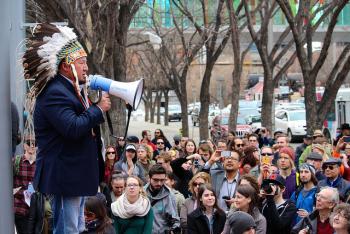The Assembly of Manitoba Chiefs is challenging the Trudeau government's approval of the Line 3 pipeline.
Grand Chief Derek Nepinak has posted on Facebook:
"Today our legal team has filed an appeal to the Federal Court of Appeal to challenge the approval of the Enbridge Line 3 replacement expansion project. Many thanks to the good people at the public interest law centre for working with us over Christmas to get this in on time..!!"
On November 29, the day Prime Minister Justin Trudeau announced his approval of the Kinder Morgan Trans Mountain pipeline, he also announced his government's approval of the lesser-known 760,000 barrel per day Enbridge Line 3 pipeline.
If not stopped, the approval of the Calgary-based Enbridge Line 3 pipeline would mean the building of 1,600 kilometres of new pipeline from Hardisty, Alberta to Superior Wisconsin, which is situated on the western tip of Lake Superior. The original 390,000-barrel per day Line 3 pipeline was built in 1968 and would be decommissioned and left underground. The new larger pipeline would carry 760,000 barrels of diluted bitumen per day and would have the capacity to do so for the next 50-60 years. Enbridge admits the pipeline would mean 19 to 26 megatonnes of upstream greenhouse gas emissions each year. Enbridge wants to replace the entire pipeline by December 2017.
In November 2015, Nepinak commented:
"Implementing the TRC [Truth and Reconciliation Commission] and the UNDRIP [United Nations Declaration on the Rights of Indigenous Peoples] would require a consultation protocol outside of the National Energy Board (NEB) process on the matters of Energy East and the Line 3 Replacement in the northern Plains (Treaty 1-11 territories). As it stands now, the only communities who are able to participate in the NEB consultation are the ones who can front the costs of participation in the hearings on a limited cost recovery budget. This means that if you don't have the money to pay for consultation, you don't get any consultation."
It was left to eight highly respected Anishinaabe (Ojibway), Nehetho (Cree) and Dakota Elders to invite National Energy Board members, government, industry, and the public to an Elders and Traditional Knowledge Keepers Gathering at Turtle Lodge in Sagkeeng First Nation, Manitoba in late November 2015 to share statements about Line 3.
The Ochapowace, Keeseekoose, George Gordon and Pasqua First Nations in Saskatchewan have also expressed concerns about the Line 3 pipeline.
The CBC has reported, "Line 3 already has presidential approval, but the replacement project must undergo separate permitting processes in the U.S. [including in Minnesota where there is significant opposition] before construction can begin." And Argus Media has highlighted:
"Fresh off a successful effort to delay the [Dakota Access pipeline], Native American and environmental groups are working to thwart plans for the [Line 3] pipeline. The proposed new route crosses grasslands in Minnesota and could threaten downstream waterways and violate treaty rights to fish, hunt and gather crops, including wild rice, opponents contend."
That article notes:
"Several tribes, which include Ojibwe groups, also known as Chippewa, have harvested wild rice in the region since the mid-1700s, a staple crop of significant spiritual and cultural value. The Minnesota Chippewa Tribal Executive Committee said in a 30 November resolution that the US Army Corps of Engineers should develop new permitting processes under the Clean Water Act for wild rice waters."
Winona LaDuke has commented, "I cannot emphasize enough the importance of protecting our sacred manoomin (wild rice) which is at the root of our cultural and spiritual ways of life with mother earth we call bimaadiziwin, living our life in a good way." Kevin Lee, an attorney with the Minnesota Centre for Environmental Advocacy, says, "The new route travels through a rich water environment and over some of the state's most pristine land." And Frank Bibeau, a member of the Chippewa tribe and an attorney for Honor the Earth, says, "We will be trying to kill off their project every day."
The Council of Canadians first expressed opposition to the building of the Line 3 pipeline in a March 2014 blog.
Photo: JMacPherson/flickr




Comments
Do
Don't